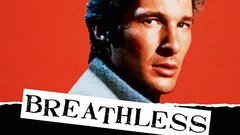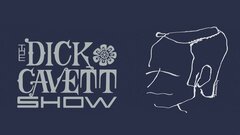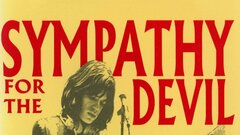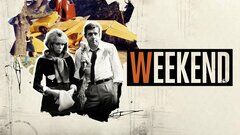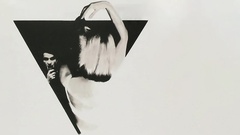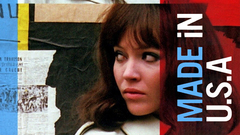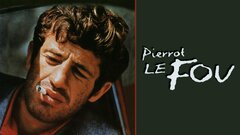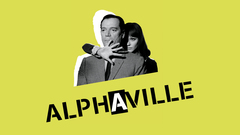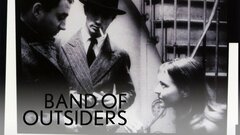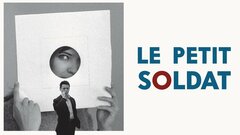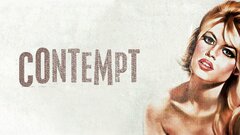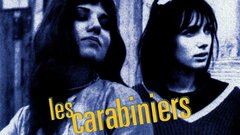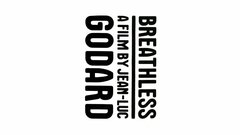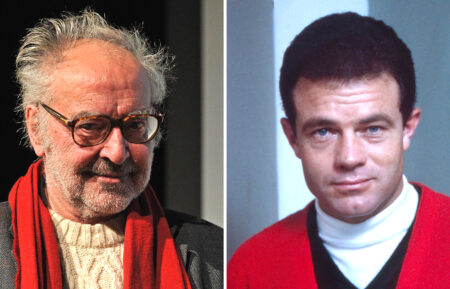Few filmmakers had so profound an effect on the development of cinema as Jean-Luc Godard, certainly one of the most important and influential directors worldwide to have emerged since the end of World War II.
From his early days as a critic and thinker in the pages of Cahiers du cinema, through the great age of the French New Wave of the 1960s, Godard redefined the way we look at film. An essayist and poet of the cinema, he made the language of film a real part of his narratives. Godard emerged on the international filmmaking scene with his most famous and perhaps best film, "Breathless" (1960), a celebration of the American film noir that also served as the stylistic template for the rest of the 1960s, widely considered to be his most fertile creative period. During that turbulent decade, Godard made no less than two films a year and sometime more, creating such experimental and increasingly politically-minded films as "Vivre sa vie" (My Life to Live") (1962), "Contempt" (1963), Bande à Part" ("Band of Outsiders") (1964) and "Alphaville" (1965), many of which starred his first wife, Anna Karina.
After making the critically panned "Weekend" (1967), a disgruntled Godard left the filmmaking business altogether in order to make political films. Once that interest waned in 1972, he entered into a transitional period of video and television projects that eventually segued into a second period of narrative filmmaking that was more experimental and inaccessible than his previous work, though some critics declared this time as being more creatively fruitful. Chief among the works was the controversial "Hail Mary" (1985), a contemporary retelling of the biblical Joseph and Mary story that was tagged by the Vatican as being blasphemous. Whether he was continuing his long love affair with film noir, as he did with "Detective" (1985), or trying new narrative techniques with the ambiguous "King Lear" (1987), Godard was not only a tireless experimenter with form and context, but also synonymous with the world of cinema itself.
Born on Dec. 3, 1930 in Paris, France, Godard was raised in a privileged home by his father, Paul-Jean, a physician, and his mother, Odile, the daughter of wealthy bankers. Having spent his upbringing in Switzerland, Godard also traveled to and from his family's various estates while attending school at the Lycée Buffon in Paris. But World War II forced him to go back to Switzerland until the war was over. Upon his return to Paris following the war, Godard discovered the Cinematheque Francaise, a film club formed by silent movie buff Henri Langlois, who had preserved numerous films and screened them in small rooms. Because of his diverse and eclectic tastes, Langlois' ciné-club was one of the more popular ones to have sprung up in post-war France. It was there that Godard began to meet some of the filmmakers that made up the French New Wave, including Jacques Demy, Claude Chabrol, Éric Rohmer and Francois Truffaut. While his interest in film turned into obsession, eventually trumping his desire to become a novelist, Godard placated his parents, who wanted him to have a steady career, by enrolling at the Sorbonne to study ethnology.
But he instead spent his time watching movies, sometimes three a day, which led to his family cutting off his allowance for neglecting his studies. In 1950, Godard put his literary aspirations to use writing articles for a short-lived film publication edited by Éric Rohmer. Two years later, he began writing for the intensely literary magazine, Cahiers du Cinema. It was through his work for Bazin that Godard began formulating the central ideas behind his future films: a love for classic American cinema, a penchant toward the political, a vehement distaste for contemporary Hollywood, and the grandiose idea of using cinema to band together the whole of Western civilization. Meanwhile, Godard began making up for the loss of income following his allowance being cut off by stealing from friends, family and even the offices of Cahiers du Cinema. His mother helped secure him employment with a Swiss television station, where he was again caught stealing and had to be bailed out jail by his father. A final disgrace following his theft of his grandfather's first editions of Paul Valéry's work, inscribed by the poet himself, led to checking himself into a mental hospital at his father's request.
At the time, Godard was known to carry a razor blade in his wallet just in case he wanted to commit suicide. But his radical obsession with film eventually led Godard to make his own films, which started while he took a construction job building a dam in Switzerland. His original intention was to save enough money to make his first film, but instead he rented a camera on his days off and filmed a short documentary about the dam's construction. Godard sold the film to the construction company and returned to Paris, where he resumed writing for Cahiers du Cinema while living off the profits of his sale. He also began making fictional shorts, including "Une Femme Coquette" (1955), while writing film reviews for Arts magazine. In 1957, Godard briefly worked in the publicity department for the Paris office of 20th Century Fox, after which he was hired as a press attaché for Artistes Associes. Meanwhile, his documentary short about the Swiss dam, "Operation Concrete," had its first public screening in 1958, while the following year he started writing a gossip column for Temps de Paris. But all was prelude to his next project; one that would catapult him to international stardom and cement forever his place in cinema history as one of its finest and most influential auteurs.
With "Breathless" (1960), his landmark feature debut, Godard broke with established narrative conventions, spontaneously mixing elements from the detective, comedy and suspense genres, while using a variety of techniques including hand-held cameras, location shooting, improvised dialogue and a loose narrative, that came to define the essence of the French New Wave. On the surface, "Breathless" was the story of a petty thief (Jean-Paul Belmondo) wanted for the murder of a police officer, who returns to Paris where he meets an American girl (Jean Seberg), a student and aspiring journalist unwittingly called upon to help hide him from the law. Underneath, however, the film was a loving ode to American film noir, with numerous references littered throughout; the most obvious being the thief modeling his image on Humphrey Bogart, while breaking seemingly every rule in the book - from jump-cut editing in the middle of a shot to characters looking directly into camera and breaking the proverbial fourth wall. "Breathless" turned Godard into an international celebrity who won numerous awards, including a Silver Bear for Best Director at the 1960 Berlin Film Festival, while the film itself joined the ranks of Truffaut's "The 400 Blows" (1959) and Alain Resnais' "Hiroshima mon amour" (1960) as the preeminent examples of French New Wave.
Because of the enormous notoriety he gained from "Breathless," Godard publicly wished that his next film would be a failure. And in a way it was. Deciding that there was something fundamentally wrong with the way people were leading their modern lives, Godard was ready to turn to political action as a solution. With his second film, "Le petit soldat" (1960), a deeply personal love story set during France's notorious war against Algeria, Goddard earned a degree of notoriety and even a few death threats prior to French authorities banning the film, largely due to scenes depicting torture. By this time, Godard was entering a fertile period that lasted well into the decade, only to end abruptly when he defiantly left the movie industry to make political documentaries. In 1961, he married actress Anna Karina, with whom he spent the next three years in a turbulent affair that sometimes saw Godard disappear for weeks at a time with no warning or explanation. But Karina starred in some of the director's finest work, including "A Woman Is a Woman" (1961), his whimsical send up of the musical comedy in which she played a nightclub striptease artist who decides it is time to have a child.
With a prodigious sense of exploration, Godard's films at the time tended to focus on couples who are alienated both from each other and from their environment; driven by uncertainty and mistrust and surrounded by the crass commercialism of late 20th century capitalism, they act arbitrarily with often tragic results. This was best exemplified in a critics' favorite, "Vivre sa vie" ("My Life to Live") (1962), an almost documentary-like look at a young Parisian woman (Karina), who abandons her husband and child to pursue an acting career, only to fall into prostitution which results in a tragic end. Arguably one of his most remarkable films, "My Life to Live" was structured into 12 sequences, with one of his typical scenes in which he drifts into philosophical discourse, which culminated in a stark commentary on the consumerist culture of modern day Paris. In one of his less brilliant efforts from the era, "Les Carabiniers" (1963), Godard discussed the politics of war in absurdist terms, with a screenplay co-scripted by one of Godard's key influences, Roberto Rossellini.
Turning for the first time to big-budget filmmaking, Godard directed French superstar Brigitte Bardot in "Contempt" (1963), one of his more compelling works that was both a relationship drama about a screenwriter (Michel Piccoli) hired by an arrogant American producer (Jack Palance) to adapt Homer's Odyssey while his marriage with a beautiful French woman (Bardo) crumbles, and a cynical satire on mainstream filmmaking and the never-ending conflict between art and consumerism. The latter was never on display fuller than the opening scene, which featured a nude Bardot asking her husband about whether or not he likes particular parts of her body. Shot at the insistence of American producers after Godard considered the film completed, the scene was unusually tame in its sexuality; a jab of the thumb from the director who rankled at the idea of others tampering with his work. Still, the film stood the test of time as one of Godard's finest pieces. In one of his more accessible films, "Band of Outsiders" ("Bande à Part") (1964), Godard followed three alienated youngsters (Anna Karina, Claude Brasseur and Sami Frey) who plan to rob a suburban house, leading to disastrous results. Another tour de force in terms of style, the film also served as inspiration for numerous filmmakers, including Quentin Tarantino, who named his production company, A Band Apart, after the movie.
Over the next three years, Godard continued to make challenging films, even as he secretly grew more frustrated with the moviemaking business. After a lesser work, "The Married Woman" (1964), he blended film noir with dystopian science fiction for "Alphaville" (1965), in which he created a uniquely menacing, futuristic look out of largely contemporary settings. The ambitious "Alphaville" told the tale of secret agent Lenny Caution (Eddie Constantine), who arrives at the titular capital of a fictional totalitarian state to destroy its leader, Alpha 60, an almost human-like supercomputer that has outlawed free thought. Godard directed his sixth film with his ex-wife Karina, "Pierrot le fou" ("Crazy Pete") (1965), a sad tale about an errant husband (Jean-Paul Belmondo) who abandons his wife and infant daughter in order to run away with the babysitter (Karina). With "Masculin-Feminin" (1966), Godard for the first time tackled the youth culture of the 1960s with this tale about a young man (Jean-Pierre Léaud) who engages in a love affair with a burgeoning singer (Chantal Goya).
As a favor to financially struggling producer Georges de Beauregard, Godard made the wildly disjointed "Made in USA" (1966), a dense and deliberately fragmented attempt to satirize the American crime thriller, starring Anna Karina in her last full-length feature for the director. Meanwhile, "Two or Three Things I Know About Her" (1967) was considered by some as the greatest of his masterpieces, being memorable for such stunning set-pieces as the coffee-cup cosmos and the model city built of consumer goods. Godard himself served as both filmmaker and narrator, commenting on the dysfunctional bourgeois universe he depicts via a housewife (Marina Vlady) who works part-time on the sly as a prostitute. Though little-seen as compared to his other work, "La Chinoise" ("The Chinese") (1967), turned out to be one of his more exquisite and fondly remembered films, if only because it was prescient of the New Left activism in France that came to the world's attention during the crippling workers strike in 1968. By the time he made "Weekend" (1967), Godard had reached a point where cinematic conventions no longer mattered. A Maoist diatribe against the evils of consumer society as seen through the eyes of a bourgeois couple (Mireille Darc and Jean Yanne), "Weekend" completely eschewed any semblance of normalcy, as characters directly addressed the camera, music rises and falls with no rhyme or reason, and the camera moves according to the director's own whim. Experimental to the extreme, the film proved to be one of Godard's least accessible films, while marking not only the end of his fertile 1960s period, but also his desire to make narrative fiction for the next decade.
Rejoining his colleagues from Cahiers du Cinema, Godard participated in the 1968 demonstrations over the dismissal of Henri Langlois as head of the "Cinematheque Francaise," which for them tied in with the famous nationwide worker strikes and student unrest which came to a head in May of that year. Then from 1968-1972, Godard made 11 political films; over half in collaboration with Jean-Pierre Gorin, whose involvement often varied from project to project, with most released as signed by the "Dziga-Vertov Group." By invoking the name of one of early Soviet cinema's most inventive filmmakers, Godard and Gorin were, according to them, "making political films politically." Although they claimed to have no answers, "only questions," their films appeared to address and support militant issues. Yet in the end, it was clear that Godard and Gorin had more concern with the process of filmmaking than with the process of revolution. Throughout their collaboration, they became obsessed with the job of turning theory into practice. "British Sounds" (1969) was perhaps the most successful of Godard's so-called revolutionary experiments, a collection of images and sounds meant to incite discussion about workers, women, students and revolution in general.
The "Dziga-Vertov" period culminated with two films: "Tout va bien" (1972) and "A Letter to Jane" (1972). "Tout va bien," with Yves Montand and Jane Fonda, was one of his more accessible films from this period, complete with international stars. As if in reaction, "Letter to Jane" was an essay about an image of Jane Fonda in Vietnam which had appeared in the magazine L'Express. A 45-minute monologue by Godard/Gorin, "Letter to Jane" explained much about their theories of images and sounds, and how they related to politics. Following the line of thinkers whose most influential spokesperson had been Bertolt Brecht, the Dziga-Vertov Group politicized the kind of cinema Godard himself had been creating all along; one which established critical distance and reflection on a film's subject matter through constant disruption of any invisible realistic style.
The Dziga-Vertov Group disbanded in 1973, with Gorin moving to California to teach and Godard moving on to video, which proved to be a better medium for the essays and experimentation he had in mind. In 1975, he left Paris for Grenobl to collaborate with his third wife, Anne-Marie Mieville, on intimate, challenging television and video work. The main productions of the video period were the two series, the ten-hour "Six Fois Deux/Sur et sous la communication" (1976) and the six-hour "France-Tour-Detour-Deux-Enfants" (1978). Godard started with the premise that "video is for those who do not see." These series comprised essays on commonplace everyday subjects, including family, love and work; all as they were presented by the media for mass consumption. With some success, Godard challenged the passivity of television viewers and their unquestioning acceptance of media messages. Individual segments of the "Six Fois Deux" series examined the mass media's approach to such subjects as unemployment, farming, the language of images, photo news, math, madness and society, and, of course, filmmaking. In separate segments, real people with direct knowledge of each area of inquiry, including a farmer, a filmmaker and a mathematician personally discussed these topics and their representation in the media.
"France-Tour-Detour-Deux-Enfants" juxtaposed philosophical interviews with two children (ages 9 and 12) from the same family about the meaning of daily activities against images of everyday life with their parents, including watching television. For the first time, in these projects for the small screen, Godard took on the role of teacher to share with a much larger audience his understanding of the complex language of film and TV. In 1975, Godard released two films: "Numero Deux;" notable not only for its bold sexuality, but also for his spare usage of only parts of the frame, and "Comment Ca Va," which indicated the direction for the future. Starting in 1980, Godard continued the reinvestigation of concerns and themes he had first developed in the 1960s. "Sauve qui peut (la vie)" (1980) and "Passion" (1982) gave portraits of emotional confusion mixed with commentary on the problems of filmmaking. With his next three films, Godard hit his stride again, starting with "First Name: Carmen" (1983), which imaginatively retold the old story of Bizet's opera Carmen alongside crime drama about a group of young people plotting to rob bank. His next film, "Detective" (1985), a challenging comic homage to the crime genre that was dedicated to John Cassavetes, Edgar G. Ulmer, and Clint Eastwood, brought Godard back, marking one of his most accessible films in years.
But it was "Hail Mary" (1985) which truly marked Godard's return to cinematic prominence. This modern nativity tale placed the story of Joseph (Thierry Rode) and Mary (Myriem Roussel) in contemporary society, and filled it with rampant jealousy and loneliness, and a bitter divorce. Adding to the controversy was a healthy amount of nudity and coarse language, leading to some in the Catholic world - particularly the Vatican - to denounce the film as blasphemous. More serious critics, however, observed that the film was in fact quite devout in its faithful depiction of the famous biblical story.
Regardless, there was no doubt that Godard had finally bridged the gap between his fertile 1960s period and the more difficult to understand 1970s. In 1987, the ever-prolific and experimental Godard turned out three more films. His segment of the omnibus feature "Aria" was one of the funnier exercises, setting Jean-Baptiste Lully's opera "Armide" in a gymnasium with brooding, nude female workers contemplating the murder of muscle-bound males. "Soigne ta droite" was a docu-essay on French pop group Les Rita Mitsouko, drawing comparisons to his earlier "One Plus One" (1968), which had intercut the Rolling Stones recording "Sympathy for the Devil" with fragments of contemporary English life.
Meanwhile, "King Lear" (1987) marked Godard's English-language debut, which featured American theater director Peter Sellars as the Bard's descendent, William Shakespeare the Fifth, who has been tasked with restoring his famed ancestor's lost works. Rounding out the cast with Molly Ringwald as Cordelia, Burgess Meredith as Lear and Woody Allen as Mr. Alien, "King Lear" unfortunately proved to be one of his weaker efforts of this period. While not a cause celebre, "Nouvelle Vague" ("New Wave") (1990), an experimental fantasy about big business machinations on a Swiss estate, continued Godard's very personal quest to understand the nature and meaning of the movies.
Though difficult at times to understand, "New Wave" nonetheless offered rhythmic images and sound sublimely edited together. Godard's affectionate video, "History of the Cinema" (1991), and his feature "Germany Year 90 Nine Zero" (1991), which revisited both Rossellini's classic "Germany Year Zero" (1947) and Godard's own "Alphaville," further confirmed his singular position taken to explore the relationship between cinema and life itself. His work seemed to become that of an artist in the twilight of his career, as in "Helas Pour Moi" ("Woe Is Me") (1993), which reworked the Greek myth of Amphitryon to explore the issue of God's role in human lives.
Turning the camera directly on himself following decades of making personal allusions, Godard made the documentary "JLG/JLG: autoportrait de décembre" ("JLG/JLG: Self-Portrait in December") (1994), a meditative self-portrait that referenced his works in the larger context of cinema and the world itself. He next directed "For Ever Mozart" (1996), an often difficult film that followed a French theater troupe on their way to Sarajevo that is captured and held in a POW camp. Both a strong criticism of European policy towards Yugoslavia and of war in general, the film was confusing to the point of undermining any political point it was trying to make.
In 1998, he completed "Histoire(s) du cinema," a video project started in the late 1980s that examined the history of cinema in its relation to the 20th century. With "Eloge de l'Amour" ("In Praise of Love") (2001), Godard unsurprisingly turned to digital filmmaking after shooting the first part in 35mm black and white, bridging the gap between the past and future of cinema in this more straightforward narrative about show business.
Meanwhile, "Notre musique" ("Our Music") (2004) earned critical praise for his reflections on art, violence and morality while deftly connecting past colonialism with the current Israeli-Palestinian conflict. While awaiting the release of his next excursion into politics and the cinema, "Socialisme" (2010), it was announced that Godard would receive an Honorary Oscar at the 2011 Academy Awards alongside Francis Ford Coppola, Eli Wallach and film preservationist Kevin Brownlow. Famously disdainful of any film awards, as well as a veritable recluse, Godard failed to respond publicly to the news despite numerous attempts by the media to contact him, leading to speculation that the touchy director might well prove to be a no-show for the ceremony.
Jean-Luc Godard died in Rolle, Switzerland on September 13, 2022.










































































































